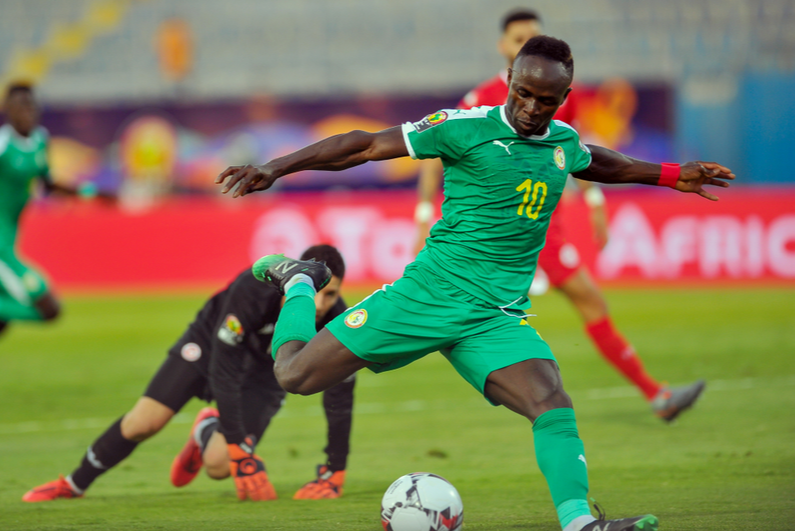Africans light up many leagues
Chelsea’s Didier Drogba, Barcelona’s Samuel Eto’o, AC Milan’s George Weah, and Leeds United’s Tony Yeboah lit up soccer leagues in England, Italy, and Spain in the 1990s. Now, Liverpool’s duo of Mohamed Salah and Sadio Mane are currently doing the same, along with Chelsea’s Edouard Mendy, Manchester City’s Riyad Mahrez, and AC Milan’s Franck Kessie.
African soccer players fill the rosters of leading franchises across the world
Alongside these main box-office stars, African soccer players fill the rosters of leading franchises across the world. Watching this year’s 2021 Africa Cup of Nations (AFCON) tournament in Cameroon, it’s clear the technical prowess gained from so many Africans playing in these major leagues has improved the standard of the continent’s national teams by light-years.
Teams like Nigeria, Senegal, and Ivory Coast are exhilarating to watch, and comfortable applying the modern era, German-based tactic of counterpress, basically swarming the opposition defense and forcing errors. Last month, one Manchester United supporter going by the handle DiamondVee even took to Twitter to suggest his English side take a leaf from Nigeria’s playbook:
In the past, managers and pundits would often praise African soccer players for their individual skill and physicality, while questioning their technical ability. This is not the case anymore, and with so much talent on display at AFCON, why is the tournament not taken seriously?
From bizarre refereeing decisions to playing the wrong national anthems, Vegas Slots Online News has taken a closer look at why the tournament is so malignant.
Lenient officials
African soccer has a history of corruption, and some of the erratic decisions made by match officials at this year’s AFCON suggest this may be an ongoing issue. Evidently, this is one reason the betting public, the media, and knowledgeable football fans might not take the tournament as seriously as others.
worst tackle ever”
Our first example of a bizarre refereeing decision comes from the very first minute of this year’s AFCON in a game between Cameroon and Burkina Faso. Cameroon’s Collins Fai made a bee-line for the Burkinabe goal when Steeve Yago flew in with a horror challenge some fans on social media labeled the “worst tackle ever.”
ESPN FC took to Twitter with an image of the foul challenge it dubbed “one of the wildest tackles we’ve ever seen”:
Flying in with his studs raised high, Yago seemed intent on playing the man, not the ball, catching Fai in the groin with a potential career-ending tackle. Instead of immediately dismissing Yago from the field with a red, Algerian referee Mustapha Ghorbal raised a yellow card from his pocket, stunning players, commentators, and fans alike.
Fevered refereeing
This year’s AFCON Group F opener between Tunisia and Mali saw another officiating blunder you would likely never witness in any other major soccer tournament.
Despite a second half featuring lengthy stoppages of play for five substitutions, two penalties including one checked by Virtual Assistant Referee (VAR), and a sending off, Zambian referee Janny Sikazwe inexplicably blew the whistle to end the game five minutes before the end of the regulation 90 minutes.
African soccer’s governing body, the Confederation of African Football (CAF), previously suspended Sikazwe in 2018 as part of a corruption investigation. The CAF later cleared the referee however, citing insufficient evidence.
Sikazwe then restarted the match, only to blow his whistle again 17 seconds before the 90 minutes had ran their course. Pandemonium erupted as the teams left the pitch with Mali 1-0 victors. Around 35 minutes later, AFCON officials asked the teams to come back out and play. Tunisia refused, with manager Mondher Kebaier claiming his players had begun their recovery in ice baths.
Award-winning Ghanaian sports journalist Saddick Adams shared via Twitter an image of the disgraced referee on his return to Zambia:
AFCON’s head of referees Essam Abdel-Fatah has since defended Sikazwe, alleging that the official was suffering from heatstroke and severe dehydration caused by the 34-degree heat and 65% humidity in Cameroon.
“It caused him to lose time in the 80th minute, and he ended the match in the 85th minute,” Abdel-Fatah told MBC Egypt’s Al loaf. “He returned after directions from the assistant staff and then returned to finish the match in the 89th minute.”
Sleepy linesmen
Egypt’s Mo Salah in full flight bears a likeness to the Looney Tunes’ Road Runner, his legs moving so fast they’re almost a blur. The Liverpool player was involved in the game featuring our next AFCON fail, which also bore some cartoonish resemblance in its absurdity.
goalkeeper Yassine Bounou left his goal to help his team’s cause
Morocco were down 1-2 to Egypt with under two minutes of added stoppage time left on the clock, and had decided to throw everything into one last attempt to tie the game, including their goalie. The trailing team had won a corner, and goalkeeper Yassine Bounou left his goal to help his team’s cause, having scored a memorable last-minute winner for his Spanish club Sevilla in 2021.
However, instead of lofting the ball into the box with the added advantage of an extra head, Morocco strangely played the ball short with their keeper out of his goal. Egypt easily swept it away, knocking it to an onrushing Salah. Cue a high-speed comedy chase shared by Dimeh via Twitter:
Salah and two of his teammates sped the length of the field towards the empty goal faced with just one defender. With the goal gaping, Ramadan Sobhi made a hospital pass to Salah, who could only prod the ball into the side netting.
The linesman should have immediately raised his flag for offside, with the Moroccan goalie Bounou well in front of the ball. Luckily, Salah’s miss saved the linesman’s blushes, but the play involved questionable decisions from all over the field.
Goalie gaffe or dodgy pitch
What follows next is a tragi-comedy – a dramatic late moment in the match that cost the Ivory Coast the win against Sierra Leone.
In real-time, Ivorian goalkeeper Badra Ali Sangare’s gaffe appeared as a hilarious piece of monumentally bad goalkeeping. When watching that footage again in slow motion, as SkySports Football shared via Twitter, another reason emerges as to why AFCON may receive criticism:
The Ivorians led 2-1 in the third minute of injury time when Sangare tried to catch a ball headed back to him by a teammate. Astonishingly, he then dropped the ball, allowing an opposition player to square it for Sierra Leone’s Alhaji Kamara to score and tie the game.
The sequence left Sangare in a heap on the ground, writhing in pain. The goalie wasn’t trying to hide his blushes by simulating an injury — a soccer player’s specialty — as it later turned out. When Sangare acrobatically retrieved the ball in mid-air, his trailing foot caught the turf. On normal professional soccer pitches, he should have slid. Instead, his foot dug into the grass, ripping out a huge chunk of the sub-standard surface, and forcing his leg to twist at an unnatural angle.
Medical officials stretched Sangare off, leaving defender Serge Aurier to see out the match between the posts. According to AfricaTopSportsIvory Coast coach Patrice Beaumelle said his keeper had to be taken to hospital.
he didn’t deserve this”
“He was crying, he was in a lot of pain, the doctors were on it. I hope it’s not very serious for him, because I don’t understand […] what happened, he didn’t deserve this,” Beaumelle stated.
Only a few hours after the game, Sangare tragically also learned of the death of his father.
Just run it off
In Senegal’s quarter-final win against Equatorial Guinea, Senegal’s Sadio Mane chased down a long aerial pass, with goalkeeper Vozinha bearing down on an interception course. Challenging for the ball with their heads, as Vozinha was outside his handling area, the two collided at frightening velocity.
Mane seemed momentarily unconscious as his head bounced heavily on the surface. Vozinha, meanwhile, appeared punch-drunk, staggering around and fighting with officials and teammates as he deliriously refused to be subbed.
Ultimately, Cameroon made the controversial decision to keep Mane on the field. Although Mane scored moments later, he then fell to the ground and required the help of teammates before finally being replaced. Sports journalist George Addo Jnr took to Twitter with an image of the two protagonists in hospital:
After former EPL and FIFA-listed referee Keith Hackett discovered Senegal had named Mane in the side for their semi-final game against Burkina Faso, which Senegal won, he raised some concerns. According to the Liverpool EchoHackett said from what he knew about concussion protocol, players should take it easy for 14 days, “stay calm and not do too much physical exercise.”
“It has to be an area of concern. I have no doubt that the Liverpool medical team, who are top drawer, will be asking questions about their player,” Hackett added.
Striking up the wrong tune
The playing of national anthems before a game is a serious matter. Take a look at the uplifting, call to arms that Italy’s national tune sparks in players and fans alike. So when AFCON officials played the wrong national anthem for Mauritania ahead of their clash against Gambia not once, but three times, the Mauritanians unsurprisingly looked completely bemused.
As the farcical scenes played out, the stadium announcer said Mauritania would then sing it themselves, without any music, as UK sportsbook Paddy Power shared via Twitter:
The third attempt, however, was quickly cut short after the country’s outdated anthem finally made it into the sound system. Maybe starting the game at a psychological disadvantage, Mauritania went behind 0-1 in the tenth minute. Gambia eventually won the game with the solitary goal.
Continued issues but a bright future
In an interview with De Telegraaf before the tournamenta reporter asked Ajax Amsterdam striker Sebastian Haller if he’d choose to stay and play two games in the Dutch Eredivisie, or join his Ivory Coast teammates for AFCON.
Haller sparked debate by asking if the reporter would make a European player choose between club and country. He said the line of questioning “shows the disrespect for Africa.” TV pundit and former England and Arsenal striker Ian Wright praised Haller for his stance, stating that media coverage of the AFCON was disrespectful and “tinged with racism.”
Farce and controversy are part of the fabric of the game
While there might be some element of truth in this, the reality is that there is still a litany of errors plaguing AFCON. Our long list of examples reveal that for Africa’s countless world-class soccer players, farce and controversy are part of the fabric of the game on their home continent.
As Salah’s Egypt take on Mane’s Senegal on Sunday in the AFCON final, we can only hope the tournament ends on a thrilling, yet serious note. Once organizers and African football bodies get their houses in order, it will be only a question of time before a team from the great continent makes Pele’s prediction come true and lifts the FIFA World Cup for the first time.




